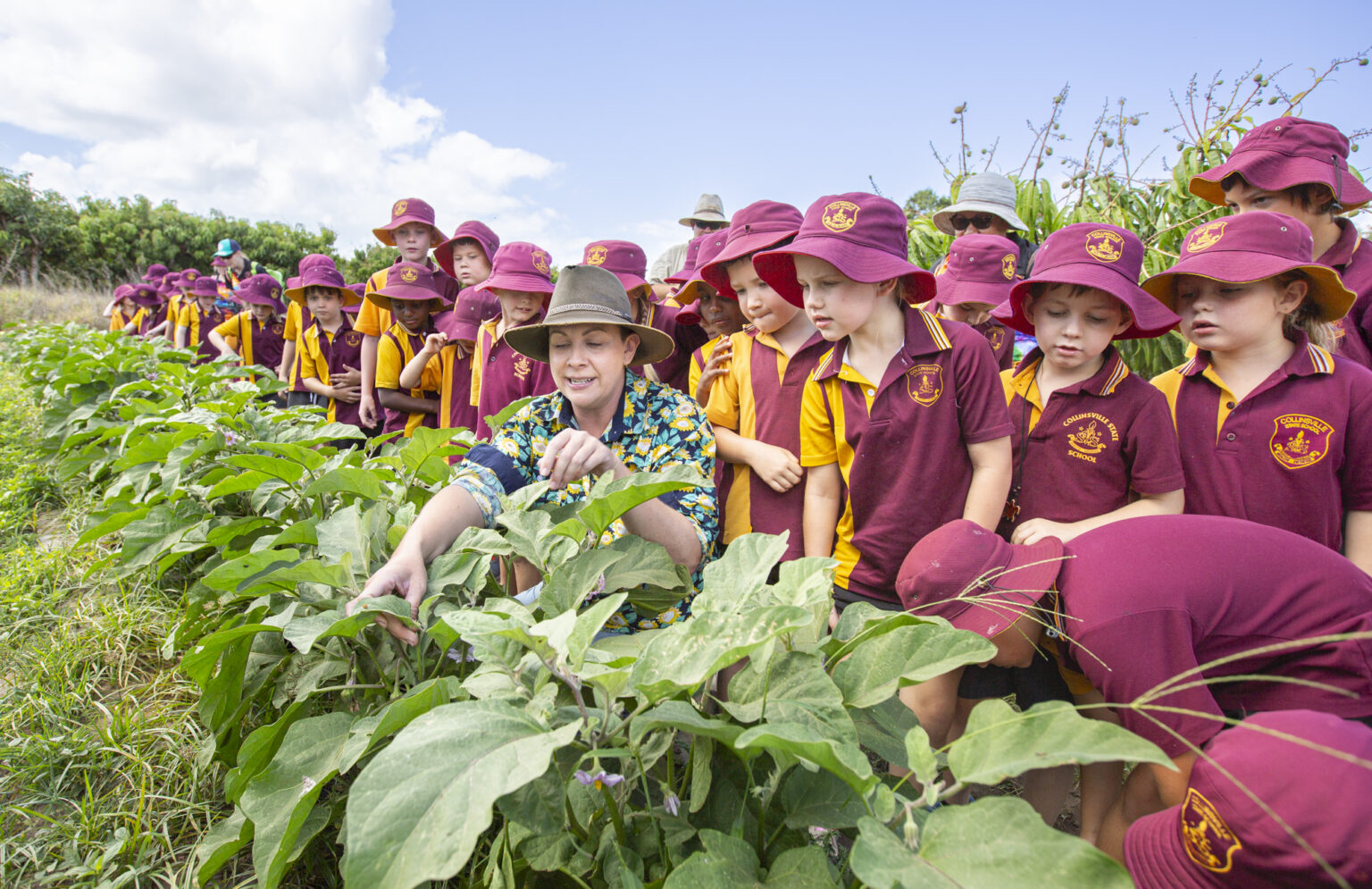Grower embraces benchmarking for success

Jessica Volker explains the role of beneficial insects in a crop of eggplant during a farm visit by Collinsville State School students. Picture: Supplied
After becoming an independent agronomist and mum of two in 2020, Jessica Volker realised she had bitten off more than she could chew.
Jessica and husband, Luke, were already producing mangoes under the Lower Don Organics name at the small farm they had bought three years earlier near Bowen, in North Queensland.
The couple decided to expand and diversify production, planting spare land to passionfruit and eggplant, which allowed Luke to leave his job as a boilermaker and work full-time on the farm.
"Being certified organic works really well, because I'm not in competition with the clients that I work for, and it's a good little niche market," Jessica said.
"Every year since that first year when we started, we've added a new type of crop into production."
Over time, they have trialled cherry tomatoes, gourmet tomatoes, green beans and capsicums, and - as well as leasing land - last year bought a bigger property.
Jessica said they have always been able to sell everything they grow.
Most is sold through agents in the Brisbane, Sydney and Melbourne wholesale markets, with smaller volumes going to a local organic store and the on-farm shop which operates on an honesty system.
Opportunities and risks
Bowen's climate presents unique opportunities and hazards. Known as the 'dry tropics', and Australia's largest winter vegetable growing region, the summer wet season replenishes underground aquifers and dams, providing water for use through efficient trickle irrigation systems.
"If you want to grow a good vegetable, you don't want any water touching that fruit, because it reduces the quality," Jessica said.
"You get little cracks in the fruit, and fungal diseases, so Bowen is really the optimal place to grow what we grow here."
However, organic farming limits Jessica's ability to use fungicides when it does rain. A tropical low delivered more than 500mm of rain from late January to mid-February, causing minor to moderate flooding across the region, and her green beans were rotting.
"It's understandable," she said.
"We've already decided that we're going to get another shade house and plant in there at the start of the year, and push our plantings back a little bit to try and reduce this risk next year.
Challenges
Running a small organic farm comes with other challenges and Jessica is the first to admit time management is a constant struggle.
As an agronomist working with local growers during peak seasons, she often finds herself stretched thin, but that income has been essential for building the business.
"We've been able to purchase a lot of new equipment because when you're starting a farm, you don't have anything," she said.
"Every single year we're buying new infrastructure, new equipment."
The couple has ambitious plans for the next five years. Paying off their new property is a top priority, along with increasing production and expanding the area under protected cropping.
By keeping workers busy year-round through greenhouse operations, they aim to reduce downtime during the summer off-season and maintain a steady income.
Making every dollar count
As a member, and treasurer, of the Bowen Gumlu Growers Association, Jessica is always on the lookout for grants and funding to help offset the cost of new infrastructure, which can be a major expense when setting up a new farm.
The Volkers installed two tunnel houses with assistance from the Australian Government's Horticultural Netting Program and found them suitable for growing good crops of organic capsicums, which had struggled in the field.
They also signed up for the Level Up Hort program, which gives vegetable and onion growers access to free specialist business advice for up to five years.
Jessica admits their data collection ahead of the first year was rudimentary. They had been changing crops and weren't tracking production and sales by commodity or costs by individual categories such as labour and fertiliser.
They weren't surprised to learn insurance premiums were well above the average - given their location in a cyclone and floodprone area - but growing expenses also were identified as above the norm.
With guidance from Planfarm consultant Maria Fathollahi, they have improved record keeping and Jessica said the upcoming round of benchmarking results would be pivotal for business decisions.
'This next report will give us a clearer picture of what's going on, which commodities are performing well and which aren't," she said.
"We need year on year figures to see trends. I think it's going to show the Roma tomatoes were a waste of money last year, and I've already taken them out. To hear them say that will be confirmation that we're on the right track."
Jessica said some of her grower clients were already doing their own benchmarking.
"But there are some other established growers that would be wasting money because they aren't," she said.
"I think if you're not doing it yourself, you definitely need someone to point out where you could be losing money."
Why benchmarking matters
Benchmarking is not just about comparing numbers; it's about driving meaningful change within farm businesses.
A five-year initiative fully funded through Hort Innovation, the Level Up Hort program equips vegetable and onion growers to analyse costs, yields and profitability against their own and industry benchmarks.
Business consultants from experienced project partners Planfarm or RMCG undertake specialised business reviews with each participant, valued at up to $10,000 per year.
They receive two confidential reports each year - a full business analysis and a benchmarking report -identifying both strengths and areas for improvement.
The broader industry also benefits from de-identified, aggregated data published in a national report that informs policy advocacy and research and development priorities.
This article appeared in the winter 2025 edition of Australian Grower
